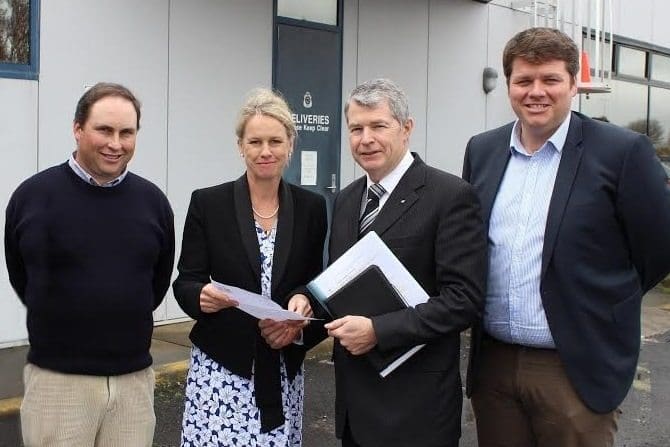
Livestock SA member Lachie Haynes, Koppamurra; assistant Health Minister Fiona Nash; SA Liberal Senator David Fawcett; and Livestock SA southern secretary Tom Dawkins.
A SOUTH Australian-driven campaign to reinstate subsidised Q Fever vaccinations is continuing at a national level, despite a lack of Federal Government support for the initiative.
Livestock SA has sought support from the national livestock bodies — WoolProducers Australia, the Sheepmeat Council of Australia and the Cattle Council — on the issue.
Also last week at Mount Gambier, Assistant Minister for Health Fiona Nash was presented with a letter from Livestock SA’s southern region outlining the strong case for the reintroduction of the Commonwealth’s Q fever vaccination subsidy which was discontinued a decade ago.
Federal Health Minister Sussan Ley told the ABC last month she would keep a “watching brief”, but was not prepared to support a vaccination program at this stage.
However, Livestock SA southern region secretary Tom Dawkins said there was a compelling argument for a new subsidy to be introduced alongside a comprehensive awareness campaign encouraging livestock industry professionals to seek vaccination.
“A new generation of farmers, stock agents, shearers and other contractors have now entered the livestock industry since the last vaccination program ended.
“To reduce the threat posed by Q fever in rural communities, we are calling for a new national Q fever program be funded; including the subsidisation of vaccinations of all individuals in rural areas over 15 years of age who have not previously been vaccinated,” he said.
Q fever is one of the most debilitating diseases affecting farmers and workers in agricultural industries. Sufferers are forced to stop work for weeks and up to months. It is carried by a wide range of animals including livestock. It is a notifiable disease in Australia and doctors are required to report any confirmed cases. About 450 cases are recorded annually, with the majority in rural areas. It is believed many more cases go undiagnosed.
Q Fever vaccination requires a screening test and an injection which have been quoted at $150-$400.
Livestock SA said the risk of contracting Q fever is greater during dry seasonal conditions, like those being currently being experienced across many areas of Australia, including the South East of SA.
A Q fever vaccination has been available in Australia since 1989 and in 2001 the Federal Government launched a National Q Fever Management Program, providing the systematic delivery of a subsidised Q fever vaccination service to populations with a high risk of environmental exposure.
Mr Dawkins said he was grateful to South Australian Liberal Senator David Fawcett, who presented the letter to Minister Nash on behalf of Livestock SA’s southern region members.
“We are grateful for the opportunity to discuss the importance of a new Q fever vaccination program with Minister Nash and Senator Fawcett.
“We are encouraged by their genuine interest in the matter and look forward to the Federal Government’s response.”
Livestock SA president Geoff Power has also contacted Federal Agriculture Minister Barnaby Joyce to highlight the merits of a new subsidy for Q fever vaccinations.
“Livestock SA is aware of a number of people badly affected following infection and their plight has caused many in rural communities in South Australia to consider their own vulnerability to the disease.
“It is now ten years since the last Q fever vaccination program was wound-up,” Mr Power said.
“Since then many new entrants to the livestock industries have taken positions on farms and in agricultural service industries.”
Source: Livestock SA southern region



…….a vaccination has been around a lot earlier than 1989……I think it has been around since the 1950’s,……..it wasn’t acknowledged as a problem because of fears of legal action by victims, Doctors knew nothing about it and/or were discouraged to report or act on it…..I am one of the victims of the “famous” outbreaks that occurred in the mid 1970’s, at Huttons, in country Victoria, and is still talked about in Canberra to this day…….this programme is of immense concern to country people and meatworkers in general, and MUST be reinstated ASAP.